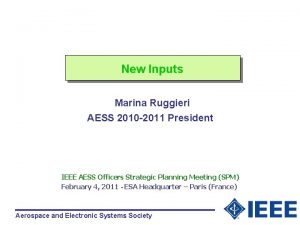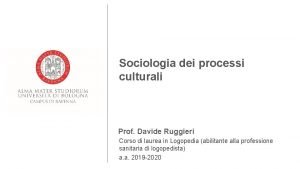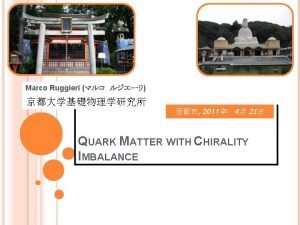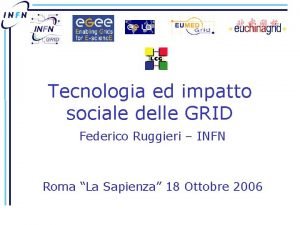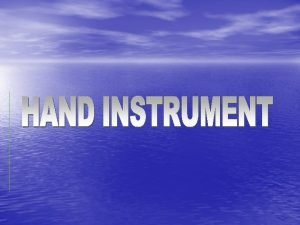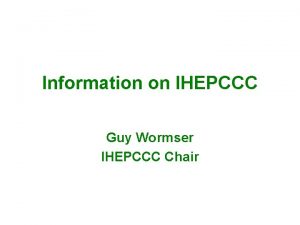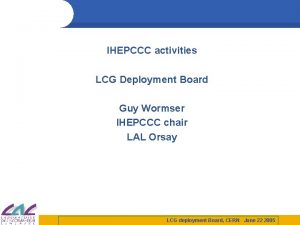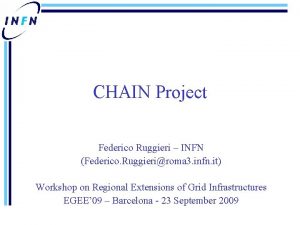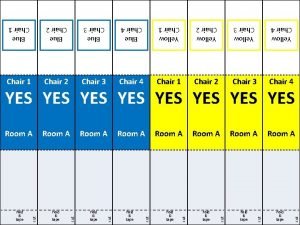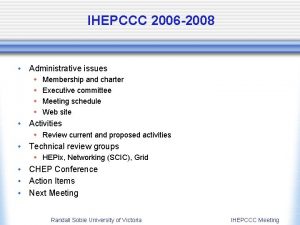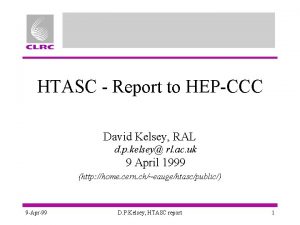Why IHEPCCC Federico Ruggieri former chair of HEPCCC










- Slides: 10

Why IHEPCCC • Federico Ruggieri, former chair of HEPCCC asked me on behalf of HEPCCC in Oct 2001 to try to internationalize this committee because of the obvious fact that HEP experiments and hence the related computing are becoming more and more international • I proposed to choose a formal route thru ICFA

IHEPCCC status and chart • IHEPCCC is a formal subcommittee of ICFA • http: //www. fnal. gov/directorate/icfa/ • ICFA : International Committee for Future Accelarators is the body representing best the world wide community of HEP • Its membership is mostly composed the directors of the major HEP labs • Formally ICFA <- C 11 <- IUPAP <-ICSU-<UNESCO • Next ICFA meeting August 20 Beijing, then Feb 2005 in TRIUMF

ICFA membership • http: //www. fnal. gov/directorate/icfa_membership. html • • • Chair J. Dorfan (SLAC) Secretary : R. Rubinstein R. Aymar, B. Foster, A. Wagner M. Witherell, S. Dawson Y. Tikhonov, V. Rubakov Chen Hescheng C. Garcia-Canal, P. Singer, D. Son S. Komamiya, Y. Totsuka R. Keeler V. Luth

IHEPCCC Terms of reference(1) • http: //www. fnal. gov/directorate/icfa/Int'l_HEPCCC. html • Mission – IHEPCCC's primary mission is to act as a forum between the main persons in charge of HEP computing, by gathering and distributing information about all relevant issues in HEP computing, and especially those with a global nature. Typical examples are information exchanges about new technology trends, computing centers' strategic policies, security issues, recommendation of standard practices, presentation of R&D results, comparison of various equipment performances.

IHEPCCC Terms of reference(2) • Other missions include: – Issuing statements and recommendations concerning computing in the HEP community. – Serving as an interface to other scientific domains on matters of computing. – Working in close connection with the ICFA SCIC, the physics regional organizations, and the HICB coordinating the grid projects in HEP. – Reporting to ICFA.

IHEPCCC Terms of reference (3) • Technical subcommittee – I_HEPCCC sponsors a technical advisory subcommittee (IHTASC), to which it may redirect technical issues. IHTASC is comprised of recognized experts in different areas of HEP computing. Upon requests by I_HEPCCC, IHTASC responds by hearing a broad range of opinions both from its own membership or, when necessary, from outside expert and by issuing clear and comprehensive recommendations. The chairperson of IHTASC is chosen by I_HEPCCC for a term of 2 years. IHTASC members are nominated by I_HEPCCC upon proposals of all its members for a term of 2 years. IHTASC

IHEPCCC Terms of reference (4) • Bureau – • Meetings – • The I_HEPCCC will normally convene twice a year. Participation via phone/videoconferences can be organized if necessary, and efforts to colocate these meetings with major HEP or computing conferences should be encouraged. Their venue will rotate among the various world regions. Meetings of the regional delegations can be organized at will. Information Policy: – • The I_HEPCCC committee will elect a bureau composed of six members (including the I_HEPCCC chair and the technical subcommittee chair). Two members should come from Europe, 2 from America and 2 from Asia and Russia. The role of the bureau, chaired by the I_HEPCCC chair will be to prepare the agenda of the plenary meetings and to follow up all action items arising. They shall meet at least before each IHEP_CCC meeting. I_HEPCCC documents and publishes its activities. The recommendations will be issued to the community through ICFA. This charter will be reviewed by the IHEPCCC committee after an initial period of one year.

IHEPCCC membership • 21 members : • D. Bhawalkar (Indore) M. Delfino(Barcelona) P. Avery (Gainesville) • H. Chen (IHEP/Beijing) M. Kasemann (DESY) B. Gibbard (BNL) • D. Son (Daegu) M. Mazzucato (Padova) R. Mount (SLAC) • G. Taylor (Melbourne) W. von Rueden (CERN) R. Sobie (Victoria) • Y. Watase (KEK) M. Turala (Krakow) V. White (Fermilab) • P. Watkins (Birmingham) F. Wuerthwein (San Diego) • G. Wormser (Orsay) – Chair • A. Hoummadda (Casablanca ) V. Ilyin (Moscow) A. Santoro (Rio de Janeiro)

Topics of interests • HEP computing in a global world: how to adapt: Grid technology and organizational changes • The growing importance of “astroparticle” computing • HEP and other sciences • Major technical future challenges – eg: Peta. Byte Storage, Security, Licences • Creation of a HEP Virtual Organization

Work in close contact and avoid duplication with other committees • • LHC organization, LCG project, GDB, . . ICFA SCIC on networking HICB Various Grid projects e. IRG group in Europe Regional computing committees (HEPCCC) technical bodies : HEPi. X, GGF, . . .
